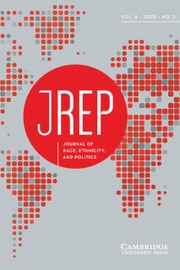Article contents
Unequal values: equality and race in state of the union addresses, 1960–2018
Published online by Cambridge University Press: 28 October 2021
Abstract
We analyze the prevalence and framing of references to equality and inequality in presidential state of the union addresses (SOTUs) delivered between 1960 and 2018. Despite rising income inequality and increased attention among political elites to structural inequalities of race and gender in recent years, we find very few direct or indirect references to inequality as a social problem and surprisingly few references even to the ostensibly consensual and primary values of equal opportunity and political equality. References to racial inequality have been few and far between since the height of the civil rights era. By contrast, another primary value in the American political tradition—economic individualism are a major focus in these SOTUs. We trace the scant presence of equality talk in these speeches to the ambiguous scope of egalitarian goals and principles and their close tie-in with race in America. We rely on automated text analysis and systematic hand-coding of these speeches to identify broad thematic emphases as well as on close reading to interpret the patterns that these techniques reveal.
- Type
- Research Article
- Information
- Copyright
- Copyright © The Author(s), 2021. Published by Cambridge University Press on behalf of The Race, Ethnicity, and Politics Section of the American Political Science Association
References
- 3
- Cited by


